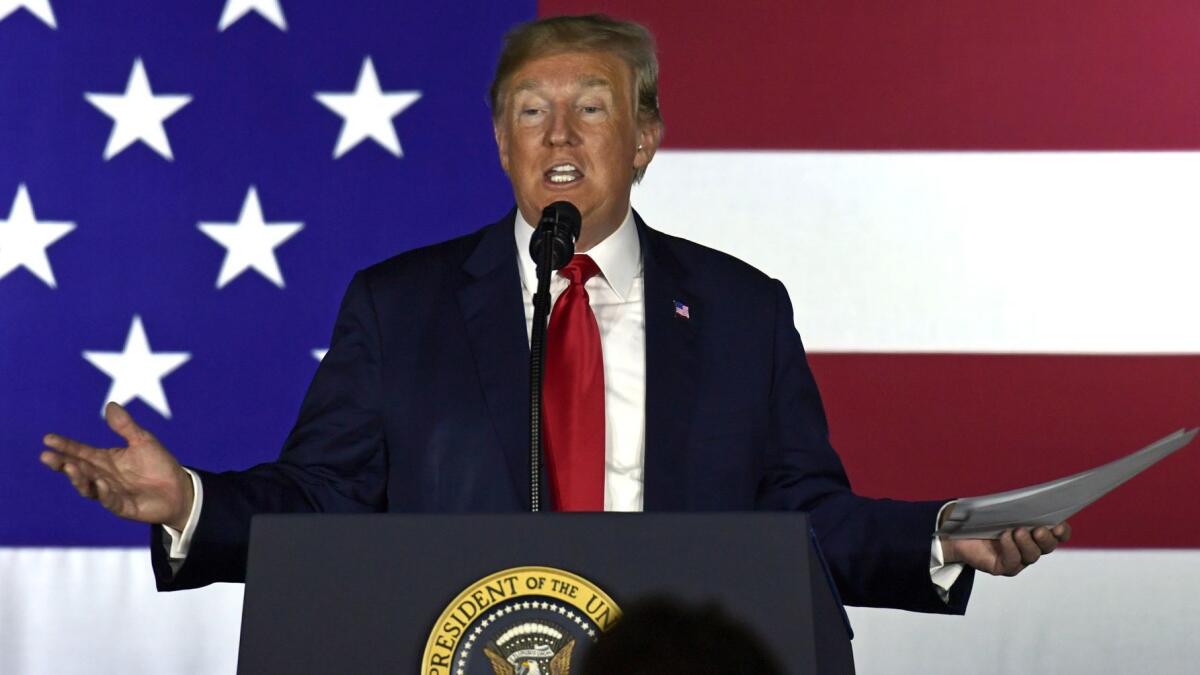Trump threatens to expand U.S.-China trade war, saying even more tariffs are ‘ready to go’

- Share via
President Trump said he’s ready to impose tariffs on an additional $267 billion worth of Chinese goods on short notice, on top of proposed tariffs on $200 billion worth that his administration is putting the final touches on.
The implementation of tariffs on $200 billion worth of products from China “will take place very soon depending on what happens,” Trump told reporters Friday on Air Force One. “I hate to do this, but behind that there is another $267 billion ready to go on short notice if I want.”
Gains made by U.S. stocks evaporated after Trump’s remarks, with the Standard & Poor’s 500 index falling 0.3% to its lowest level in two weeks by 1:26 p.m. Eastern time.
If Trump follows through on his latest tariff threats, that would more than cover the value of all goods the United States buys from China, according to U.S. government data from last year. The U.S. imported $505 billion worth of Chinese products in 2017, Census Bureau figures show.
Levying duties on all purchases from China would hit “every aspect of our American lifestyle — so the clothes that we put on our back, the food that we eat, the cars that we drive, the shoes that we wear,” said Hun Quach, vice president of international trade for the Retail Industry Leaders Assn.
The Trump administration has already slapped duties on $50 billion worth of Chinese goods since July, which spurred immediate in-kind retaliation from Beijing. China has said it would be forced to respond to all of the U.S. tariff measures, fanning concerns that a deepening trade war could dent the global economic outlook.
Members of the public had until Thursday to comment on the Trump administration’s plan to slap tariffs on $200 billion worth of Chinese goods, ranging from bicycles and baseball gloves to digital cameras. That paved the way for Trump to be able to announce the tariffs as early as Friday.
There’s no final decision on that round of tariffs as the U.S. trade representative’s office continues to “run their process,” White House Deputy Press Secretary Lindsay Walters said Friday.
The president’s tough line contrasted with remarks earlier from White House economic advisor Larry Kudlow, who left open the possibility of a negotiated solution to the trade dispute but said China must show it’s open to compromise.
Trade talks
While China’s response to U.S. demands has been unsatisfactory, Trump is still speaking to Chinese President Xi Jinping and would be willing to meet in person, said Kudlow, director of the White House’s National Economic Council. An opportunity to do so could arise when world leaders gather at the United Nations General Assembly in New York this month or at the Group of 20 summit in Argentina in November, he said.
“It’s never too late to make good trade policy,” Kudlow said. “But I will say this: The world trading system is broken.” Trump is “dead serious” in his determination to push China to change its trade policies, he added.
Trump is getting a last-minute earful from prominent technology companies and retailers as he considers whether to follow through with his plan to ratchet up tariffs on imports from China.
Companies issue warning
On Thursday, Cisco Systems Inc., Hewlett Packard Enterprise Co. and other technology companies sent a letter to U.S. Trade Representative Robert Lighthizer urging the administration to avoid imposing more tariffs. Increasing duties on telecommunications networking gear would raise the cost of accessing the internet and slow the roll-out of next-generation wireless technologies, the companies said.
Manufacturers, particularly small and midsize firms, can’t quickly adjust and the tariffs imposed so far haven’t led to any meaningful concessions, a coalition of the National Retail Federation and 150 organizations said in separate comments to Lighthizer. The Trump administration should cease further tariff actions and give talks for a trade deal with China another shot, it said.
“Tit-for-tat tariffs are counterproductive and so far have only produced increased costs for American businesses, farmers, importers, exporters and consumers,” the coalition said.
Pettypiece writes for Bloomberg.
More to Read
Inside the business of entertainment
The Wide Shot brings you news, analysis and insights on everything from streaming wars to production — and what it all means for the future.
You may occasionally receive promotional content from the Los Angeles Times.










